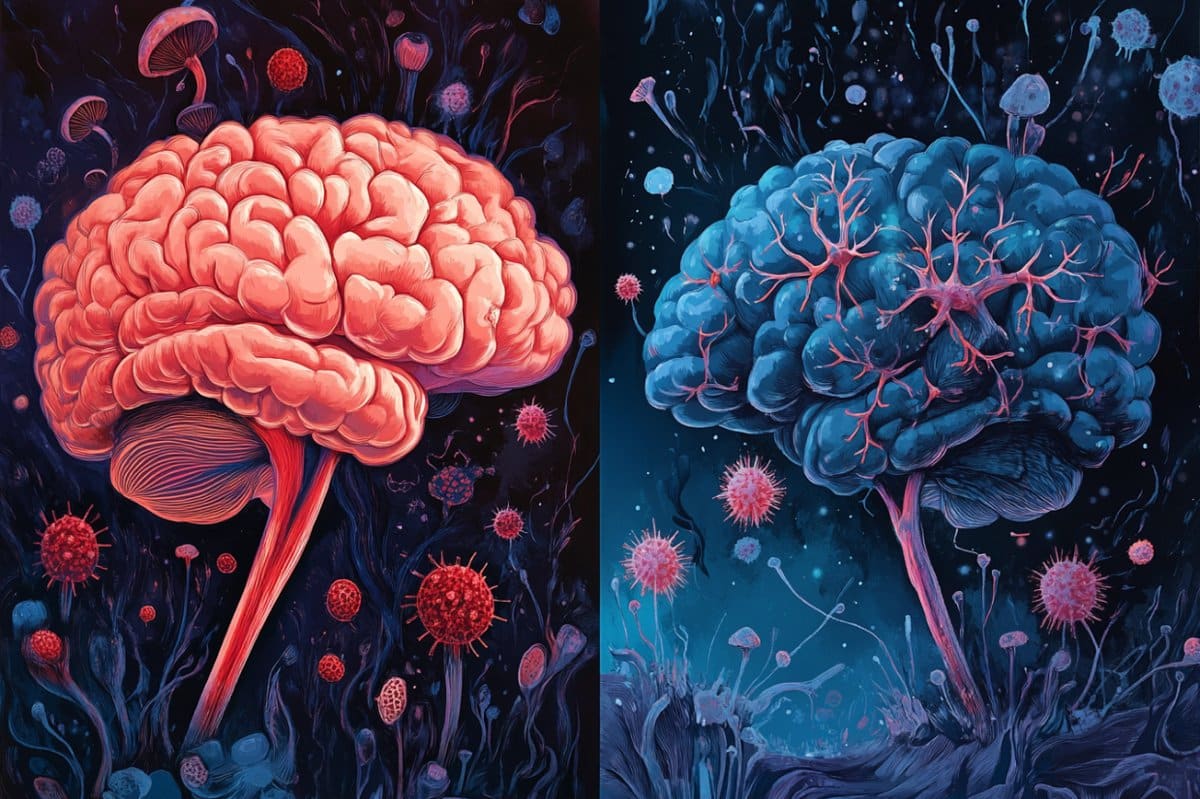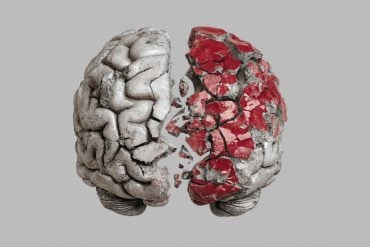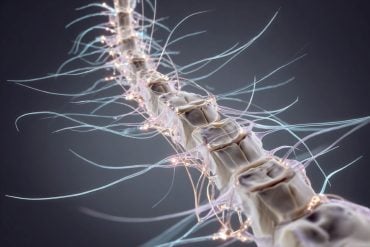Summary: A new study reveals that chronic stress activates immune cells that travel to the brain, amplify inflammation, and heighten fear responses. Researchers found that psychedelics like MDMA and psilocybin disrupt this immune-brain crosstalk, reducing stress-related fear in mice and showing similar effects in human tissue samples.
These findings suggest psychedelics may help reset dysfunctional neuroimmune pathways involved in depression, anxiety, and inflammatory diseases. While not a cure-all, this research opens new therapeutic possibilities for targeting the root of emotional and immune dysregulation.
Key Facts:
- Fear-Inflammation Link: Stress triggers immune cells to migrate to the brain and activate fear pathways.
- Psychedelic Protection: MDMA and psilocybin blocked immune-driven fear responses in preclinical models.
- Human Relevance: Similar immune-brain signaling was found in human tissues and depression datasets.
Source: Brigham and Women’s Hospital
Mass General Brigham researchers found that interactions between immune and brain cells drive fear responses, but treatment with psychedelics like MDMA and psilocybin may reverse these effects.
A new study suggests that fear and the immune system are connected in previously unknown ways. Researchers at Mass General Brigham found that the immune system can influence stress and fear behaviors by changing how brain cells communicate.

The investigators further showed that psychedelic treatments could target these neuroimmune interactions and reduce stress-induced fear in preclinical models and found similar results in human tissue samples.
Results are published in Nature.
“Our study underscores how psychedelics can do more than just change perception; they can help dial down inflammation and reset brain-immune interactions,” said corresponding author Michael Wheeler, PhD, of the Gene Lay Institute of Immunology and Inflammation as well as the Ann Romney Center for Neurologic Diseases at Brigham and Women’s Hospital (BWH), a founding member of the Mass General Brigham healthcare system.
“This could reshape how we think about treatment for inflammatory disorders and conditions like anxiety and depression.”
Prior research has shown immune signaling can drive the development of neuropsychiatric diseases such as major depressive disorder (MDD). However, the ways that specific immune mechanisms can also affect behaviors due to chronic stress or MDD remained unclear.
Using a mouse model of chronic stress, the researchers determined that increased crosstalk between cells in the amygdala, or the brain’s fear center, boosted fear behaviors, elevated inflammatory signaling, and activated fear-promoting amygdala neurons.
Furthermore, inflammatory immune cells called monocytes migrated from other parts of the body to the brain meninges during chronic stress. The research team demonstrated that artificially manipulating these cells impacted fear behaviors.
Treating stressed mice with psilocybin and MDMA prevented monocytes from accumulating in the brain and lowered fear behaviors.
The investigators found similar signals of response to stress in human brain cells and in gene expression datasets from patients with MDD, suggesting that the same interactions between the immune system and the brain may play a role in neuropsychiatric disorders in humans.
The authors note that further experiments are needed to understand exactly how psychedelics affect immune cells and brain communication.
Next steps include examining the long-term effects of psychedelic treatment on patients with MDD or inflammatory diseases. Wheeler is currently collaborating with investigators from the Massachusetts General Hospital Center for the Neuroscience of Psychedelics on a clinical trial of patients with depression who are being treated with psychedelics and will examine their tissue samples.
“We’re not saying that psychedelics are a cure-all for inflammatory diseases or any other health condition,” said Wheeler.
“But we do see evidence that psychedelics have some tissue-specific benefits and that learning more about them could open up entirely new possibilities for treatments.”
Authorship: In addition to Wheeler, Mass General Brigham authors include Elizabeth N. Chung, Jinsu Lee, Carolina M. Polonio, Joshua Choi, Camilo Faust Akl, Michael Kilian, Wiebke M. Weiß, Georgia Gunner, Mingyu Ye, Tae Hyun Heo, Sienna S. Drake, Liu Yang, Catarina R.G.L. d’Eca, Joon-Hyuk Lee, Liwen Deng, Daniel Farrenkopf, Anton M. Schüle, Hong-Gyun Lee, Oreoluwa Afolabi, Sharmin Ghaznavi, Stelios M. Smirnakis, Isaac M. Chiu, Vijay K. Kuchroo, and Francisco J. Quintana.
Disclosures: The authors declare no competing interests.
Funding: Funding acknowledgements include the U.S. Department of Health & Human Services/National Institutes of Health (NIH), National Institute on Drug Abuse, National Institute of Neurological Disorders and Storke, and National Institute of Mental Health, National Multiple Sclerosis Society (National MS Society), Basic Science Research Program funded by the NRF of Korea/Ministry of Education (2022R1A6A3A03071157), Human Frontier Science Program (LT0015/2023-L), Gemeinnützige Hertie-Stiftung foundation, Burroughs Wellcome Fund (BWF), NIH R01AG080992 and R01AI139536, American Cancer Society (American Cancer Society Inc.), NIH NS102807, AI126880 and PA-1604-08459 from the International Progressive MS Alliance, Leopoldina Research Fellow Grant of the German Academy of Sciences, Gouvernement du Canada/Canadian Institutes of Health Research (Instituts de Recherche en Santé du Canada), Basic Science Research Program through the NRF funded by the Ministry of Education (2021R1A6A3A14039088), The Gene Lay Institute of Immunology and Inflammation of Brigham and Women’s Hospital, Massachusetts General Hospital.
About this neuroimmunity, psychology, and psychopharmacology research news
Author: Cassandra Falone
Source: Brigham and Women’s Hospital
Contact: Cassandra Falone – Brigham and Women’s Hospital
Image: The image is credited to Neuroscience News
Original Research: Closed access.
“Psychedelic control of neuroimmune interactions governing fear” by Michael Wheeler et al. Nature
Abstract
Psychedelic control of neuroimmune interactions governing fear
Neuroimmune interactions—signals transmitted between immune and brain cells—regulate many aspects of tissue physiology, including responses to psychological stress, which can predispose individuals to develop neuropsychiatric diseases.
Still, the interactions between haematopoietic and brain-resident cells that influence complex behaviours are poorly understood.
Here, we use a combination of genomic and behavioural screens to show that astrocytes in the amygdala limit stress-induced fear behaviour through epidermal growth factor receptor (EGFR).
Mechanistically, EGFR expression in amygdala astrocytes inhibits a stress-induced, pro-inflammatory signal-transduction cascade that facilitates neuron–glial crosstalk and stress-induced fear behaviour through the orphan nuclear receptor NR2F2 in amygdala neurons.
In turn, decreased EGFR signalling and fear behaviour are associated with the recruitment of meningeal monocytes during chronic stress.
This set of neuroimmune interactions is therapeutically targetable through the administration of psychedelic compounds, which reversed the accumulation of monocytes in the brain meninges along with fear behaviour.
Together with validation in clinical samples, these data suggest that psychedelics can be used to target neuroimmune interactions relevant to neuropsychiatric disorders and potentially other inflammatory diseases.






